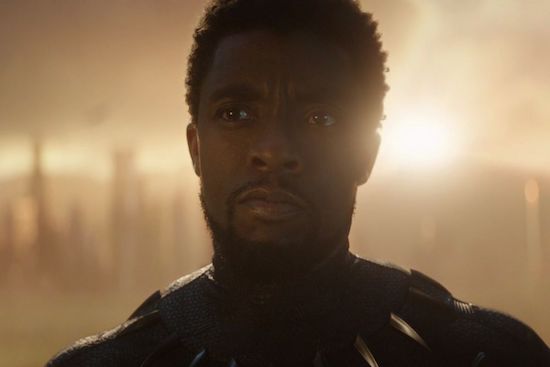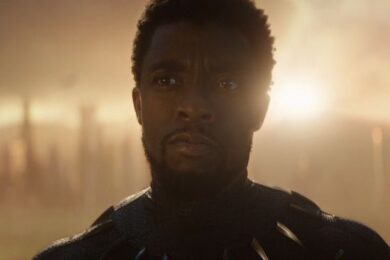I wanted him to linger. Time slowed down, when he spoke, dusted with his South Carolina drawl. His eyes shielded his vulnerability and power. The two were inextricable.
But Chadwick Boseman, Marvel’s Black Panther, is dead at 43, from colon cancer. He said he believed in purpose. I wanted a film whose artistic purpose was Chadwick Boseman – but a Black man carries the burden of working for his people. Boseman turned duty into art. He’s shown us that superheroes can be shy, goofy and human. "Purpose,” said Boseman, addressing students at his alma mater, Howard University, in 2018, “is an essential element of you. It is the reason you are on the planet at this particular time in history." He may have been describing himself, an emblem of new Black masculinity.
Boseman pursued the smaller tics of big men, from footballer Floyd Little (The Express, 2008) and baseball legend Jackie Robinson in 42 (2013) to Black rights lawyer Marshall Thurgood in Marshall (2017) and – my personal favourite – James Brown in Get On Up (2014). When pushed to command, Boseman coils inward. He is most watchable when listening, or withdrawing. In Spike Lee’s overstated and over-praised film, Da 5 Bloods, he plays Norman, a Black saviour, as a man almost disintegrating with love as he preaches to his fellow soldiers.
People of colour, especially our Black brothers, are obliged to perform dignity. Black men must be above reproach, since systematically it’s suggested that injustice is their fault. Mainstream critics praise Black heroes who are “athletic” and physically “majestic”, yet “gracious”. The Blaxploitation hero, rising with his fists from this shit, is typified by Samuel L Jackson, kingly and nasty. But the Black heroes most friendly to mainstream sensibilities – Sidney Poitier, Idris Elba, or Boseman’s mentor Denzel Washington – are gentlemanly. Playing Jackie Robinson, Boseman is told by his white boss, “We win, only if the world is convinced of two things: that you are a fine gentleman – and a great baseball player.”
Boseman did something clever with this expectation of the gentleman. He carried it, visibly, as yet another burden through the mire he must tread. As T’Challa, the Black Panther, his heroism is tainted with self-doubt, his delicate features compressed by duty.
Boseman was a creator and an avid student. He wrote plays from a young age, often using hip-hop. He trained as a director at Howard. He was sponsored by Denzel Washington to attend Shakespearean summer school in Oxford. To play T’Challa in four Marvel movies, he traced in his veins the Krio and Limba blood of Sierra Leone, and the Yoruba blood of Nigeria, via DNA testing. He incorporated Afro-Brazilian Capoeira into his fighting moves. He drew on his jiu jitsu training to access a warrior’s spiritual mindset – then added To-Shin Do, Muay Thai and over four hours of body-building. He made Black Panther and other films while diagnosed with stage III colon cancer. He had a staggering work ethic and “a manifesto”. Fired from the popular soap All My Children, because he protested the stereotyping of his gang member character, he said, “I was like, ‘This is not part of my manifesto. This is not part of what I want to do. How can I make it work?’”
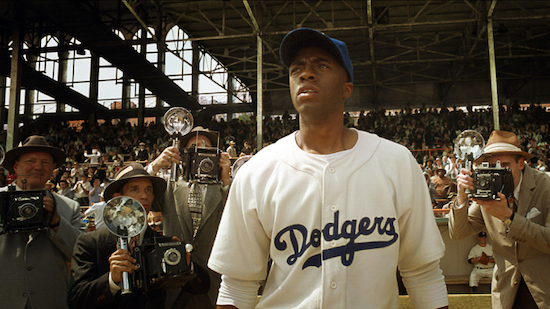
Perky and upright in person, this “work” bows Boseman’s spine, when he plays the Black hero. In 42, playing Jackie Robinson, he tells baseball executive Branch Rickey (Harrison Ford), “It doesn’t matter what I believe. It matters what I do.” One of the things Boseman does, in leadership roles, is to tuck in his honed dancer’s physique. At 6 ft, he appears far slighter than the similarly-scaled Poitier, Elba or Washington. Puckish, he magnetizes one side of the frame, where directors place him, as a centripetal force. In 42, his main “work” is “to have the guts,” as Rickey demands, “to not fight back.” The drama, in this otherwise stolid film, builds by watching Boseman being sneered at by white racists, insulted and ostracised. With Harrison Ford licking his avuncular chops, Boseman resists the obvious move of playing an outraged ingenue. He contracts towards the thing he loves: his game, his uniform and the team-mates he wins over. His inwardness redirects our eyes – much like the kinetic rebound powers of the Black Panther’s suit – towards the antagonists. Boseman negotiates white spaces the way we must: sideways.
Boseman’s most complex role is James Brown, in Get On Up. Brown’s egotism is antithetical to Boseman’s humility and ethos: “Purpose,” James Brown wheezes like a lullaby to his friend Bobby Byrd, as they lie in bed in do-rags, on tour, “ain’t gonna stop us … ain’t nothing going to stop us from what’s meant to be.”
Jez and John Henry Butterworth’s script, swinging between Brown’s abusive childhood and blistering rise, loses momentum. There’s an excellent cast and some mirthful asides by Boseman to camera, as when Brown finds himself entertaining a “honky hoedown” of white kids in a fake ski-lodge on TV. But there’s nothing to rival the hilarious and disturbing early sequence in which James Brown questions at gunpoint a seminar of insurance executives as to who has dared use his toilet.
James Brown’s pettiness isn’t given enough room within Get On Up’s marathon narrative, and the film avoids exploring Brown’s extreme domestic violence. But Boseman uses concealment to upset us and suggest worse tyrannies beyond what we see. Slickly pocketing $20 from his entourage for any act of disobedience, we can’t tell if he’s amused or incensed. As a bandleader, a submerged warning rages in his eyes. Speaking to the white press, his charm juts like a boxer’s mouthguard. Rather than bringing Brown’s aggression to the fore, Boseman squeezes it into his strangulated voice; and the deathly underbite of one who mauls you even as he gives. Yet his eyes, dulled by crack, conceal the grief of an abandoned child. It’s evident in James Brown’s backstage, slightly off-balance, clenched walk. Boseman hints at the emotional toddler old men can become, the rigid hands of one who deals the blows he’s received.
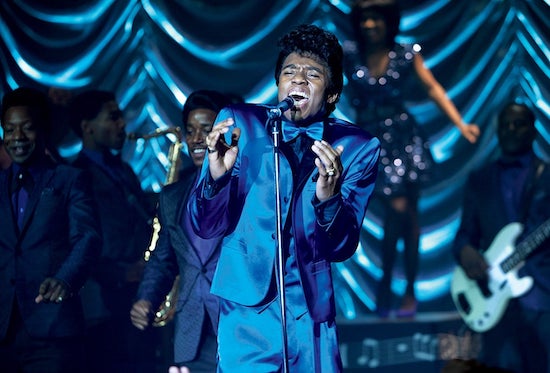
In other films, Boseman’s empathy makes him a comradely hero, one who passes you the torch. Marshall combines the team spirit of an odd-couple friendship with a hard-working, if somewhat woodenly constructed, courtroom drama about the pivotal civil rights lawyer, Thurgood Marshall, who became the first Black Justice in the Supreme Court. A white socialite accuses her Black chauffeur of rape and attempted murder. Marshall makes noble speeches; but it’s the un-chivalrousness of Boseman, speaking in natty suits with a collegiate superciliousness, that makes his character fun. Boseman refuses to bow like a gentleman. His key speech to the press on the courtroom steps is delivered with his hat back on his head, one hand in his pocket and the slouchy gait of a man with many trains to catch and cases to fight: “The Constitution was not written for us. We know that, but from now on, we claim it as our own.” Assessing each of the disgruntled journalists, Boseman raises his voice only to be heard over their shouts. Shirking the heroic pose, he makes words matter.
Chadwick Boseman saved his softest portrayal for the superhero. In some ways, Ryan Coogler’s Black Panther is a revenge drama. T’Challa is the son of a great king who is murdered by decadent relatives. But it’s also – and more importantly – a Black power wish fulfilment, about a technologically advanced African country, Wakanda. T’Challa is sincere and obedient, unlike, say, Hamlet, or Killmonger, the film’s real anti-hero, T’Challa’s spurned cousin, who returns to seize the throne.
Stan Lee’s Black Panther first appeared in The Fantastic Four comics in 1966. Wakanda was a prayer for its time, and remains so for those who still believe in Black Excellence as a means of upliftment. By disguising itself as a third world country, Wakanda inverts the kind of racial passing still required of those of us who perform indentured graciousness. Before we get carried away on Coogler’s trippy, emotionally satisfying wizardry (and I do), we might observe that Wakanda’s democratic feudalism needs a king as much as Western capitalism. Indeed, Marvel informs us in the 607th issue of Fantastic Four that Wakanda’s secret magical metal, Vibranium, sells for $10K a gram. And in a conversation with Viggo Mortensen for Variety, Chadwick Boseman enthused about “a market” for Black-led stories. The Black Panther’s authenticity relies on Western capitalism. But by doing heroism differently, Boseman has made a valuable shift from the ‘dignified’ archetype, and from Black machismo. Reading the script, he said he loved that the Black Panther, “makes you think he’s lost when he’s won.”
The Black Panther is an elegiac hero. Boseman creates a T’Challa born to remember his people, and to be remembered. He may goof around with his sister and “freeze” before his long-time love. But loss drags his shoulders. Boseman said, “I had to buy into having the weight of the hero, when sometimes the villain has fun.”
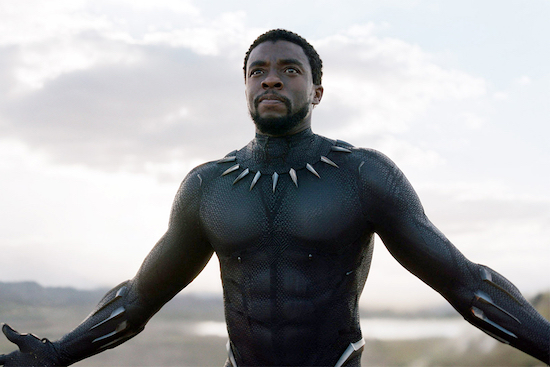
T’Challa scrutinizes each deed, shading one slightly squinting eye, like his father. Moist-eyed consternation attends his great moments in battle. He fights flanked by women and often more lissomely. In the climatic Avengers: Endgame, flanked by his beloved Nakia (Lupita Nyong’o) and his General, Okoyo (Danai Gurira), he appears in a time portal that’s like a dying sun. He lopes, pliant and dutiful. His father has told him in heaven, “It is hard for a good man to be king.” Boseman hangs that labour of goodness visibly around the Black Panther’s neck.
Boseman resisted Marvel, who wanted a British or American accent for T’Challa’s first English words in Captain America, Civil War. “It felt to me,” he said, “like a dealbreaker.” Hearing Wakandans speak the South African language Xhosa, on the battlefield and around white peers, without subtitles, is liberating for those bilingual post-colonized people who have been made to feel like sneaky foreigners when speaking our mother’s tongue in the house of our white fathers.
Boseman flipped the myth of the Black hero by never deserting his people, never making it look easy, or himself like a lofty stud. The Wakandans fear they will die in the outside world. And in their eleventh-hour stand in Infinity War, T’Challa sees they must sacrifice themselves for their allies, many of whom belong to colonizing races. This is the emblem that’s hardest to celebrate – and T’Challa does not try. The heroic declamation is left to the ferocious Okoyo: “It will be the noblest ending in history.”
Boseman is a king who hangs back among his people to the last possible second. When he gives his salute in Infinity War, he speaks to a tribe of millions deep within and around him, a woeful togetherness of warriors that is far from over: “Wakanda forever.”

